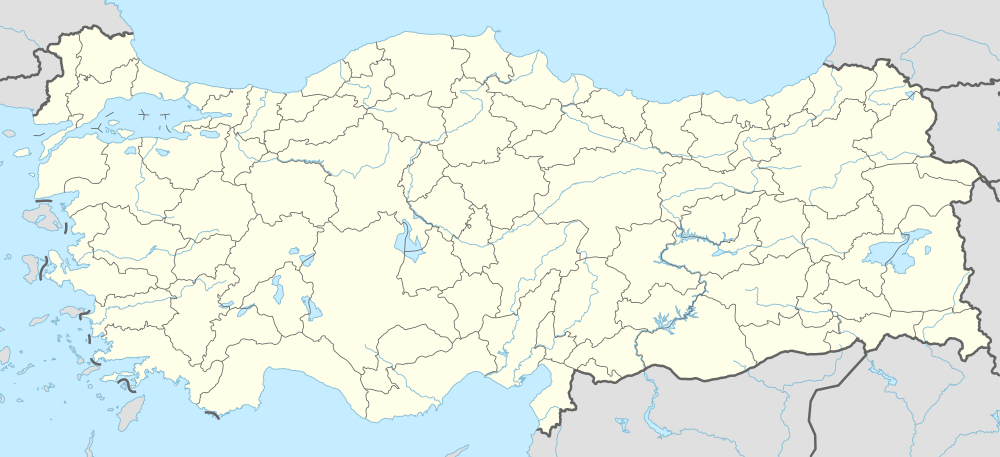SEKA Paper Museum
| SEKA Kağıt Müzesi | |
 Location within Turkey | |
| Established | November 6, 2016 |
|---|---|
| Location | Kocaeli, Turkey |
| Coordinates | 40°45′40″N 29°54′35″E / 40.76111°N 29.90972°E |
| Owner | Metropolitan Municipality of Kocaeli |
| Website |
sekakagitmuzesi |
The SEKA Paper Museum, aka SEKA Mehmet Ali Kağıtçı Paper Museum, (Turkish: SEKA Kağıt Müzesi or SEKA Mehmet Ali Kağıtçı Kağıt Müzesi) is a museum of industrial heritage in Kocaeli (İzmit), northwestern Turkey. Situated in a former pulp and paper mill, it is dedicated to papermaking in Turkey. The museum was opened in 2016.[1][2]
Background
Construction of the pulp and paper mill began with groundbreaking on August 18, 1934.[3] The mill was built as part of the industrialization efforts during the early years of modern Turkey.[1][2][4] Very first domestic paper was produced on April 18, 1936.[5][4] Named "Sümerbank İzmit Kağıt ve Karton Fabrikası" ("Sümerbank İzmit Paper and Cardboard Mill"), it officially went in production with an annual capacity of 12,000 tons on November 6, 1936.[3][6][4] Turkey's first paper engineer Mehmet Ali Kağıtçı played a major role in the foundation of the paper mill.[1][7] On June 21, 1955, it was renamed "Türkiye Sellükoz ve Kağıt Fabrikaları" (Turkish Cellulose and Paper Mills").[5] In 1997, the state-owned mill was included in the privatization process due to lack of finance for the required investment. Paper production came to halt in 2005, and it was transferred to the Metropolitan Municipality of Kocaeli.[3][4] The word "SEKA" is a portmanteau of "SEllüloz" (for "cellulose" or "pulp") and "KAğıt" ("paper).[8]
Museum
Exactly 80 years after its establishment, the mill was redeveloped into a museum by the Metropolitan Municipality of Kocaeli on November 6, 2016.[5] It is the country's first, and the world's largest paper museum. It is named after the founder of the mill, Mehmet Ali Kağıtçı.[2][7] It consists of 16 halls in a four-story building constructed on an area of 12,345 m2 (132,880 sq ft).[5][2] 443 documents, 337 objects and many photos, painstakingly selected from tens of thousands, are exhibited in 115 display cases.[7] Machinery and equipment used in the papermaking process are essential part of the museum.[1] Five printing machines were repaired, and are on display, one of which worked for 70 years continuously.[7] It also contains workshops for traditional papermaking, paper craft and paper art such as origami, kirigami, paper painting, calligraphy, miniature art, manuscript illumination and paper marbling.[1] There are sculptures created from recycled materials.[2][3][5]
In the hall at the museum building's basement, social life at the SEKA mill is narrated. The ground floor's 13 halls contain a lobby, turbine room, grinding rooms, power plant, stock preparation, cleaning, paper machine hall, Mehmed Ali Kâğıtçı Memorial Hall, temporary exhibition hall and greenhouse for plants used in papermaking. The two halls of the first floor are for pulp preparation and printing. At the second floor, there are two halls for high density pulp towers and screen room.[1]
Cloakroom, gift shops, cafeteria and restaurant are found in the entrance section of the museum.[1]
References
- 1 2 3 4 5 6 7 "Dünyanın En Büyük Kağıt Müzesi Açıldı". Milliyet (in Turkish). 2016-11-06. Retrieved 2016-11-12.
- 1 2 3 4 5 "World's largest paper museum opens in Kocaeli". Hürriyet Daily News. 2016-11-08. Retrieved 2016-11-12.
- 1 2 3 4 "SEKA Kağıt Müzesi Açılıyor". Yeşil Kocaeli (in Turksih). 2016-10-31. Retrieved 2016-11-12.
- 1 2 3 4 "Turkey's first paper factory being turned into a huge paper museum". Daily Sabah. 2014-10-03. Retrieved 2016-11-12.
- 1 2 3 4 5 "zmit'teki SEKA fabrikası Kağıt Müzesi oldu". Hürrşyet (in Turkish). 2016-10-31. Retrieved 2016-11-12.
- ↑ "Avrupa'nın en büyük kağıt müzesi Kocaeli'de açılıyor". Al Jazeera Turk (in Turkish). 2016-11-03. Retrieved 2016-11-12.
- 1 2 3 4 "Turkey's first paper museum ready to open". Daily Sabah. 2016-11-04. Retrieved 2016-11-12.
- ↑ "Kısaltmalar Dizini" (in Turkish). Türk Dil Kurumu. Retrieved 2016-11-13.